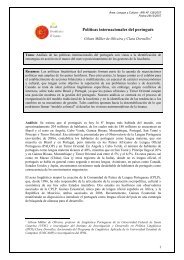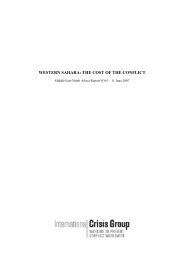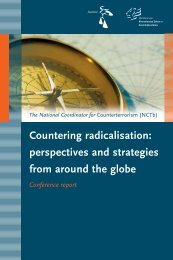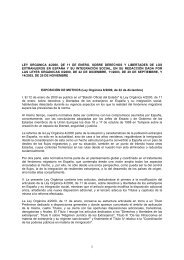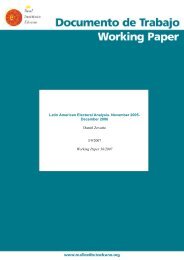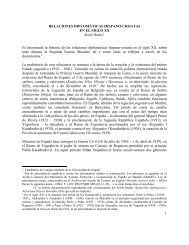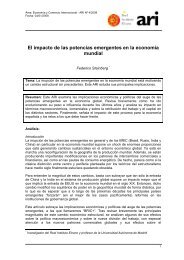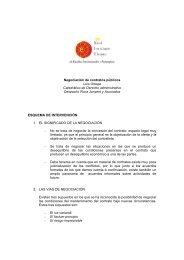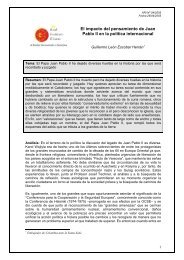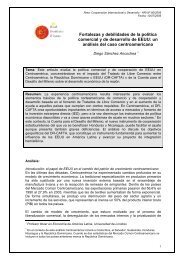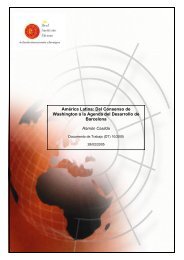Spain and the United States - Real Instituto Elcano
Spain and the United States - Real Instituto Elcano
Spain and the United States - Real Instituto Elcano
Create successful ePaper yourself
Turn your PDF publications into a flip-book with our unique Google optimized e-Paper software.
124<br />
SPAIN AND THE UNITED STATES<br />
happened in <strong>Spain</strong> after <strong>the</strong> end of <strong>the</strong> regime of General Franco (1939-75) <strong>and</strong><br />
what might occur after Castro.<br />
<strong>Spain</strong> is <strong>the</strong> largest foreign investor in Cuba <strong>and</strong> has close cultural <strong>and</strong><br />
family ties: <strong>the</strong> isl<strong>and</strong> was <strong>Spain</strong>’s last colony (1898), <strong>and</strong> it is estimated that<br />
70% of Cubans have a Spanish gr<strong>and</strong>parent (alive or dead). 1 More than<br />
150,000 Spanish tourists visit Cuba every year. The two poles of Cuban exiles<br />
in <strong>the</strong> world are Madrid, where some 60,000 Cubans live, <strong>and</strong> Miami (more<br />
than one million). The exiles in Madrid are less actively anti-Castro than <strong>the</strong><br />
ones in Miami for various reasons, including <strong>the</strong> higher degree of sympathy<br />
that exists in <strong>Spain</strong> towards <strong>the</strong> Cuban regime among certain segments of <strong>the</strong><br />
population, especially people to <strong>the</strong> left of <strong>the</strong> Socialists for whom Cuba is an<br />
emotive issue.<br />
<strong>Spain</strong>’s policy towards Cuba irritates Washington. The Bush<br />
administration regards Madrid’s belief that it can influence events in Cuba<br />
as naïve – very little has changed in <strong>the</strong> human rights situation <strong>and</strong> few<br />
political prisoners have been released. The Socialists, on <strong>the</strong> o<strong>the</strong>r h<strong>and</strong>, point<br />
to <strong>the</strong> failure of <strong>the</strong> more than 40-year US blockade of Cuba to achieve very<br />
much o<strong>the</strong>r than to harden <strong>the</strong> Castro regime. Eduardo Aguirre, <strong>the</strong> US<br />
ambassador to <strong>Spain</strong> who took up his post in June 2005, is a Cuban-American;<br />
Madrid’s relations with Cuba are high on his agenda. Both Aguirre <strong>and</strong> his<br />
wife emigrated to <strong>the</strong> <strong>United</strong> <strong>States</strong> in <strong>the</strong> early 1960s as unaccompanied<br />
minors under <strong>the</strong> “Peter Pan” programme, which brought 14,039 children to<br />
<strong>the</strong> country.<br />
The dialogue between <strong>Spain</strong> <strong>and</strong> <strong>the</strong> <strong>United</strong> <strong>States</strong> over Venezuela – where<br />
several Spanish companies have significant investments, particularly <strong>the</strong> oil<br />
<strong>and</strong> gas conglomerate Repsol YPF, which has a joint venture with Petróleos de<br />
Venezuela (PDVSA) – is also one of <strong>the</strong> deaf, <strong>and</strong> it is becoming more<br />
seriously so. Donald Rumsfeld, <strong>the</strong> Secretary of Defence, harshly criticised<br />
<strong>Spain</strong>’s sale of patrol boats <strong>and</strong> transport planes to <strong>the</strong> avowedly anti-American<br />
government of President Hugo Chávez, who claims to be building “21 st century<br />
socialism”. Again, <strong>Spain</strong>’s Socialists want to keep <strong>the</strong>ir options open <strong>and</strong> not<br />
close <strong>the</strong> door, while Washington views Chávez as a dangerous demagogue in<br />
a volatile region with ties to Cuba that are too close for comfort. <strong>Spain</strong>’s<br />
position towards Cuba <strong>and</strong>, particularly, towards Venezuela – <strong>Spain</strong> is not<br />
alone among European countries in taking a different line towards Havana to<br />
that of Washington but it is, to a greater extent, with respect to Venezuela –<br />
exemplifies <strong>the</strong> Socialists’ desire for a more autonomous foreign policy.<br />
According to <strong>Elcano</strong>’s June 2005 barometer, 60% of respondents backed <strong>the</strong><br />
1. See <strong>the</strong> three articles on Cuba by Juan Jesús Aznárez in El País (May 23, 24 <strong>and</strong> 25, 2005).



